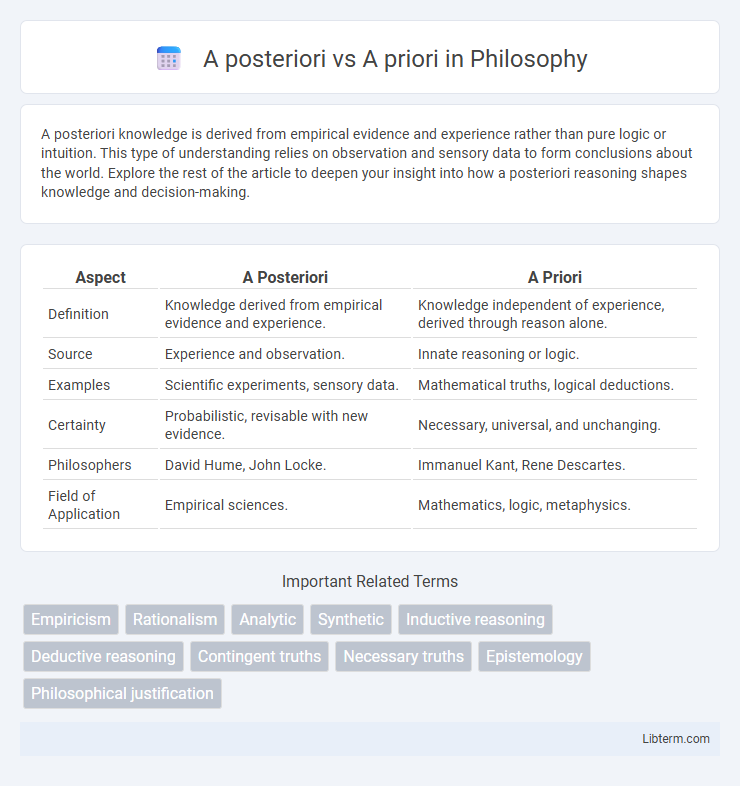A posteriori knowledge is derived from empirical evidence and experience rather than pure logic or intuition. This type of understanding relies on observation and sensory data to form conclusions about the world. Explore the rest of the article to deepen your insight into how a posteriori reasoning shapes knowledge and decision-making.
Table of Comparison
| Aspect | A Posteriori | A Priori |
|---|---|---|
| Definition | Knowledge derived from empirical evidence and experience. | Knowledge independent of experience, derived through reason alone. |
| Source | Experience and observation. | Innate reasoning or logic. |
| Examples | Scientific experiments, sensory data. | Mathematical truths, logical deductions. |
| Certainty | Probabilistic, revisable with new evidence. | Necessary, universal, and unchanging. |
| Philosophers | David Hume, John Locke. | Immanuel Kant, Rene Descartes. |
| Field of Application | Empirical sciences. | Mathematics, logic, metaphysics. |
Understanding A Posteriori and A Priori: Definitions
A posteriori knowledge refers to information gained through empirical evidence and sensory experience, relying on observation and experimentation to validate truths. A priori knowledge exists independently of experience, based on logic, reasoning, or innate understanding, often exemplified by mathematical and conceptual truths. Distinguishing between a posteriori and a priori knowledge is essential in epistemology, influencing how knowledge claims are justified and evaluated.
Historical Origins of A Posteriori and A Priori
The historical origins of a posteriori and a priori knowledge trace back to ancient philosophy, with Aristotle often credited for distinguishing empirical knowledge derived from sensory experience (a posteriori) from knowledge independent of experience, based on reason alone (a priori). Immanuel Kant later systematized these concepts in the 18th century, defining a priori knowledge as necessary and universal truths accessible through pure reason, whereas a posteriori knowledge is contingent and grounded in empirical evidence. This foundational distinction remains central in epistemology, influencing modern debates on the sources and limits of human knowledge.
Key Differences Between A Posteriori and A Priori Knowledge
A posteriori knowledge depends on empirical evidence and sensory experience, making it contingent on observation and experimentation. In contrast, a priori knowledge is independent of experience, grounded in logic, reason, and innate understanding. The key difference lies in the source of justification: a posteriori knowledge requires external validation, whereas a priori knowledge relies on internal rational deduction.
Philosophical Significance of A Posteriori vs A Priori
The philosophical significance of a posteriori knowledge lies in its foundation on empirical evidence and sensory experience, making it contingent and subject to revision based on new data. A priori knowledge, by contrast, is independent of experience and considered necessarily true, providing foundational principles essential for logic and mathematics. Understanding the distinction illuminates debates in epistemology concerning how humans acquire knowledge and justify beliefs.
Examples of A Posteriori Reasoning
A posteriori reasoning relies on empirical evidence and observation to draw conclusions, such as determining that water boils at 100degC by conducting experiments. Scientific methods like measuring the speed of light or analyzing clinical trial results exemplify a posteriori reasoning. These examples highlight how knowledge is derived from sensory experience and data collection rather than pure logic or innate ideas.
Examples of A Priori Reasoning
A priori reasoning involves deriving knowledge independent of experience, such as mathematical truths like "2 + 2 = 4" or logical statements like "All bachelors are unmarried." Philosophical examples include Descartes' cogito argument, "I think, therefore I am," which relies on innate concepts rather than empirical evidence. These examples highlight how a priori reasoning provides foundational knowledge through deductive logic and conceptual analysis.
Key Thinkers: Kant, Hume, and Rationalists
Immanuel Kant distinguished a priori knowledge as independent of experience, grounded in reason, while a posteriori knowledge relies on empirical evidence. David Hume, an empiricist, argued that all knowledge derives from sensory experience, emphasizing a posteriori understanding. Rationalists such as Descartes posited that certain truths are innate and accessible through reason alone, embodying a priori knowledge principles.
The Role of Experience in A Posteriori Knowledge
A posteriori knowledge fundamentally relies on empirical evidence derived from sensory experience and observation to form justified beliefs about the world. Unlike a priori knowledge, which is independent of experience and grounded in logic or reasoning alone, a posteriori knowledge is contingent, evolving with new data and experimental findings. Scientific methodologies exemplify a posteriori reasoning by continually testing hypotheses against real-world outcomes, highlighting the essential role of experience in validating knowledge claims.
The Role of Logic in A Priori Knowledge
A priori knowledge is fundamentally grounded in logic, involving truths that can be known independently of empirical experience, such as mathematical and logical propositions. The role of logic in a priori knowledge is to provide a necessary framework through which concepts are analyzed and validated without recourse to sensory data. This distinction elevates deductive reasoning as essential for establishing certain knowledge, contrasting with a posteriori knowledge, which relies on observation and experience.
A Posteriori vs A Priori: Modern Applications and Debates
A posteriori knowledge, derived from empirical evidence and sensory experience, plays a crucial role in modern scientific methods and data-driven technologies, contrasting sharply with a priori knowledge, which relies on logical deduction and inherent reasoning. Debates persist in philosophy and artificial intelligence regarding the extent to which machine learning models depend on a posteriori data versus embedded a priori algorithms. Contemporary applications such as natural language processing and autonomous systems illustrate the synergy and tension between these epistemological approaches in knowledge acquisition and decision-making processes.
A posteriori Infographic

 libterm.com
libterm.com